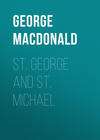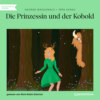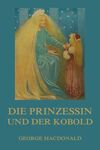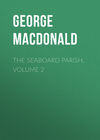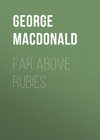Buch lesen: «St. George and St. Michael», Seite 12
Long time their talk lasted. Every now and then they would start and listen—so Dorothy interpreted sudden silence and broken renewals. The genius of the place, although braved, had yet his terrors. At length she heard something like a half-conquered yawn, and soon after the voices ceased.
Again a weary time, and once more she fell asleep. She woke in the grey of the morning, and after yet two long hours, but of more hopeful waiting, she heard Caspar's welcome footsteps, and summoned all her strength to avoid breaking down on his entrance. His first look of amazement she tried to answer with a smile, but at the expression of pitiful dismay which followed when another glance had revealed the cause of her presence, she burst into tears. The honest man was full of compunctious distress at the sight of the suffering his breach of custom had so cruelly prolonged.
'And I haf bin slap in mine bed!' he exclaimed with horror at the contrast.
Had she been his daughter and his mistress both in one, he could not have treated her with greater respect or tenderness. Of course he set about relieving her at once, but this was by no means such an easy matter as Dorothy had expected. For the key of the chair was in the black cabinet; the black cabinet was secured with one of lord Herbert's marvellous locks; the key of that lock was in lord Herbert's pocket, and lord Herbert was either in bed at Chepstow or Monmouth or Usk or Caerlyon, or on horseback somewhere else, nobody in Raglan knew where. But Caspar lost no time in unavailing moan. He proceeded at once to light a fire on his forge hearth, and in the course of a few minutes had fashioned a pick-lock, by means of which, after several trials and alterations, at length came the welcome sound of the yielding bolts, and Dorothy rose from the terrible chair. But so benumbed were all her limbs that she escaped being relocked in it only by the quick interposition of Caspar's arms. He led her about like a child, until at length she found them sufficiently restored to adventure the journey to her chamber, and thither she slowly crept. Few of the household were yet astir, and she met no one. When she was covered up in bed, then first she knew how cold she was, and felt as if she should never be warm again.
At last she fell asleep, and slept long and soundly. Her maid went to call her, but finding it difficult to wake her, left her asleep, and did not return until breakfast was over. Then finding her still asleep she became a little anxious, and meeting mistress Amanda, told her she was afraid mistress Dorothy was ill. But mistress Amanda was herself sleepy and cross, and gave her a sharp answer, whereupon the girl went to lady Broughton. She, however, being on her way to morning mass, for it was Sunday, told her to let mistress Dorothy have her sleep out.
The noise of horses' hoofs upon the paving of the stone court roused her, and then in came the sounds of the organ from the chapel. She rose confounded, and hurrying to the window drew back the curtain. The same moment lord Herbert walked from the hall into the fountain-court in riding dress, followed by some forty or fifty officers, the noise of whose armour and feet and voices dispelled at once the dim Sabbath feeling that hung vapour-like about the place. They gathered around the white horse, leaning or sitting on the marble basin, some talking in eager groups, others folding their arms in silence, listening, or lost heedless in their own thoughts, while their leader entered the staircase door at the right-hand corner of the western gate, the nearest way to his wife's apartment of the building.
Now Dorothy had gone to sleep in perplexity, and all through her dreams had been trying to answer the question what course she should take with regard to the nocturnal intrusion. If she told lady Margaret she could but go with it to the marquis, and he was but just recovering from an attack of the gout, and ought not to be troubled except it were absolutely necessary. Was it, or was it not, necessary? Or was there no one else to whom she might with propriety betake herself in her doubt—lord Charles or Dr. Bayly? But here now was lord Herbert come back, and doubt there was none any more. She dressed herself in tremulous haste, and hurried to lady Margaret's room, where she hoped to see him. No one was there, and she tried the nursery, but finding only Molly and her attendant, returned to the parlour, and there seated herself to wait, supposing lady Margaret and he had gone together to morning service.
They had really gone to the oak parlour, whither the marquis generally made his first move after an attack that had confined him to his room; for in the large window of that parlour, occupying nearly the whole side of it towards the moat, he generally sat when well enough to be about and take cognizance of what was going on; and there they now found him.
'Welcome home, Herbert!' he said, kindly, holding out his hand. 'And how does my wild Irishwoman this morning? Crying her eyes out because her husband is come back, eh?—But, Herbert, lad, whence is all that noise of spurs and scabbards—and in the fountain court, too? I heard them go clanking and clattering through the hall like a torrent of steel! Here I sit, a poor gouty old man, deserted of my children and servants—all gone to church—to serve a better Master—not a page or a maid left me to send out to see and bring me word what is the occasion thereof! I was on the point of hobbling to the door myself when you came.'
'Being on my way to the forest of Dean, my lord, and coming round by Raglan to inquire after you and my lady, I did bring with me some of my officers to dine and drink your lordship's health on our way.'
'You shall all be welcome, though I fear I shall not make one,' said the marquis, with a grimace, for just then he had a twinge of the gout.
'I am sorry to see you suffer, sir,' said his son.
'Man is born unto trouble as the sparks fly upward,' returned the marquis, giving a kick with the leg which contained his inheritance; and then came a pause, during which lady Margaret left the room.
'My lord,' said Herbert at length, with embarrassment, and forcing himself to speak, 'I am sorry to trouble you again, after all the money, enough to build this castle from the foundations—'
'Ah! ha!' interjected the marquis, but lord Herbert went on—
'which you have already spent on behalf of the king, my master, but—'
'YOUR master, Herbert!' said the marquis, testily. 'Well?'
'I must have some more money for his pressing necessities.' In his self-compulsion he had stumbled upon the wrong word.
'MUST you?' cried the marquis angrily. 'Pray take it.'
And drawing the keys of his treasury from the pocket of his frieze coat, he threw them down on the table before him. Lord Herbert reddened like a girl, and looked as much abashed as if he had been caught in something of which he was ashamed. One moment he stood thus, then said,
'Sir, the word was out before I was aware. I do not intend to put it into force. I pray will you put up your key again?'
'Truly, son,' replied the marquis, still testily, but in a milder tone, 'I shall think my keys not safe in my pocket whilst you have so many swords by your side; nor that I have the command of my house whilst you have so many officers in it; nor that I am at my own disposal, whilst you have so many commanders.'
'My lord,' replied Herbert, 'I do not intend that they shall stay in the castle; I mean they shall be gone.'
'I pray, let them. And have care that MUST do not stay behind,' said the marquis. 'But let them have their dinner first, lad.'
Lord Herbert bowed, and left the room. Thereupon, in the presence of lady Margaret, who just then re-entered, good Dr. Bayly, who, unperceived by lord Herbert in his pre-occupation, had been present during the interview, stepped up to the marquis and said:
'My good lord, the honourable confidence your lordship has reposed in me boldens me to do my duty as, in part at least, your lordship's humble spiritual adviser.'
'Thou shouldst want no boldening to do thy duty, doctor,' said the marquis, making a wry face.
'May I then beg of your lordship to consider whether you have not been more severe with your noble son than the occasion demanded, seeing not only was the word uttered by a lapse of the tongue, but yourself heard my lord express much sorrow for the overslip?'
'What!' said lady Herbert, something merrily, but looking in the face of her father-in-law with a little anxious questioning in her eyes, 'has my lord been falling out with my Ned?'
'Hark ye, daughter!' answered the marquis, his face beaming with restored good-humour, for the twinge in his toe had abated, 'and you too, my good chaplain!—if my son be dejected, I can raise him when I please; but it is a question, if he should once take a head, whether I could bring him lower when I list. Ned was not wont to use such courtship to me, and I believe he intended a better word for his father; but MUST was for the king.'
Returning to her own room, lady Margaret found Dorothy waiting for her.
'Well, my little lig-a-bed!' she said sweetly, 'what is amiss with thee? Thou lookest but soberly.'
'I am well, madam; and that I look soberly,' said Dorothy, 'you will not wonder when I tell you wherefore. But first, if it please you, I would pray for my lord's presence, that he too may know all.'
'Holy mother! what is the matter, child?' cried lady Margaret, of late easily fluttered. 'Is it my lord Herbert you mean, or my lord of Worcester?'
'My lord Herbert, my lady. I dread lest he should be gone ere I have found a time to tell him.'
'He rides again after dinner,' said lady Margaret.
'Then, dear my lady, if you would keep me from great doubt and disquiet, let me have the ear of my lord for a few moments.'
Lady Margaret rang for her page, and sent him to find his master and request his presence in her parlour.
Within five minutes lord Herbert was with them, and within five more, Dorothy had ended her tale of the night, uninterrupted save by lady Margaret's exclamations of sympathy.
'And now, my lord, what am I to do?' she asked in conclusion.
Lord Herbert made no answer for a few moments, but walked up and down the room. Dorothy thought he looked angry as well as troubled. He burst at length into a laugh, however, and said merrily,
'I have it, ladies! I see how we may save my father much annoyance without concealment, for nothing must be concealed from him that in any way concerns the house. But the annoyance arising from any direct attempt at discovering the wrongdoers would be endless, and its failure almost certain. But now, as I would plan it, instead of trouble my father shall have laughter, and instead of annoyance such a jest as may make him good amends for the wrong done him by the breach of his household laws. Caspar has explained to you all concerning the water-works, I believe, cousin?'
'All, my lord. I may without presumption affirm that I can, so long as there arises no mishap, with my own hand govern them all. Caspar has for many weeks left everything to me, save indeed the lighting of the furnace-fire.'
'That is as I would have it, cousin. So soon then as it is dark this evening, you will together, you and Caspar, set the springs which lie under the first stone of the paving of the bridge. Thereafter, as you know, the first foot set upon it will drop the drawbridge to the stone bridge, and the same instant convert the two into an aqueduct, filled with a rushing torrent from the reservoir, which will sweep the intruders away. Before they shall have either gathered their discomfited wits or raised their prostrate bones, my father will be out upon them, nor shall they find shelter for their shame ere every soul in the castle has witnessed their disgrace.'
'I had thought of the plan, my lord; but I dreaded the punishment might be too severe, not knowing what the water might do upon them.'
'There will be no danger to life, and little to limb,' said his lordship. 'The torrent will cease flowing the moment they are swept from the bridge. But they shall be both bruised and shamed; and,' added his lordship, with an oath such as seldom crossed his lips, 'in such times as these, they will well deserve what shall befall them. Intruding hounds!—But you must take heed, cousin Dorothy, that you forget not that you have yourself done. Should you have occasion to go on the bridge after setting your vermin-trap, you must not omit to place your feet precisely where Caspar will show you, else you will have to ride a watery horse half-way, mayhap to the marble one—except indeed he throw you from his back against the chapel-door.'
When her husband talked in long sentences, as he was not unfrequently given to do, lady Margaret, even when their sequences were not very clear, seldom interrupted him: she had learned that she gained more by letting him talk on; for however circuitous the route he might take, he never forgot where he was going. He might obscure his object, but there it always was. He was now again walking up and down the room, and, perceiving that he had not yet arranged all to his satisfaction, she watched him with merriment in her Irish eyes, and waited.
'I have it!' he cried again. 'It shall be so, and my father shall thus have immediate notice. The nights are weekly growing warmer, and he will not therein be tempted to his hurt. Our trusty and well-beloved cousin Dorothy, we herewith, in presence of our liege and lovely lady, appoint thee our deputy during our absence. No one but thyself hath a right to cross the bridge after dark, save Caspar and the governor, whom with my father I shall inform and warn concerning what is to be done. But I will myself adjust the escape, so that the torrent shall not fall too powerful; Caspar must connect it with the drawbridge, whose fall will then open it. And pray remind him to see first that all the hinges and joints concerned be well greased, that it may fall instantly.'
So saying, he left the room, and sought out Caspar, with whom he contrived the ringing of a bell in the marquis's chamber by the drawbridge in its fall, the arrangement for which Caspar was to carry out that same evening after dark. He next sought his father, and told him and his brother Charles the whole story; nor did he find himself wrong in his expectation that the prospect of so good a jest would go far to console the marquis for the annoyance of finding that his household was not quite such a pattern one as he had supposed. That there was anything of conspiracy or treachery involved, he did not for a moment believe.
After dinner, while the horses were brought out, lord Herbert went again to his wife's room. There was little Molly waiting to bid him good-bye, and she sat upon his knee until it was time for him to go. The child's looks made his heart sad, and his wife could not restrain her tears when she saw him gaze upon her so mournfully. It was with a heavy heart that, when the moment of departure came, he rose, gave her into her mother's arms, clasped them both in one embrace, and hurried from the room. He ought to be a noble king for whom such men and women make such sacrifices.
To witness such devotion on the part of personages to whom she looked up with such respect and confidence, would have been in itself more than sufficient to secure for its object the unquestioning partisanship of Dorothy; partisan already, it raised her prejudice to a degree of worship which greatly narrowed what she took for one of the widest gulfs separating her from the creed of her friends. The favourite dogma of the school-master-king, the offspring of his pride and weakness, had found fitting soil in Dorothy. When, in the natural growth of the confidence reposed in her by her protectors, she came to have some idea of the immensity of the sums spent by them on behalf of his son, had, indeed, ere the close of another year read the king's own handwriting and signature in acknowledgment of a debt of a quarter of a million, she took it only as an additional sign—for additional proof there was no room—of their ever admirable devotion to his divine right. That the marquis and his son were catholics served but to glorify the right to which a hostile faith yielded such practical homage.
Immediately after nightfall she repaired to Caspar, and between them everything was speedily arranged for the carrying out of lord Herbert's counter-plot.
But night after night passed, and the bell in the marquis's room remained voiceless.
CHAPTER XX
MOLLY AND THE WHITE HORSE
Meantime lord Herbert came and went. There was fighting here and fighting there, castles taken, defended, re-taken, here a little success and there a worse loss, now on this side and now on that; but still, to say the best, the king's affairs made little progress; and for Mary Somerset, her body and soul made progress in opposite directions.
There was a strange pleasant mixture of sweet fretfulness and trusting appeal in her. Children suffer less because they feel that all is right when father or mother is with them; grown people from whom this faith has vanished ere it has led them to its original fact, may well be miserable in their sicknesses.
She lay moaning one night in her crib, when suddenly she opened her eyes and saw her mother's hand pressed to her forehead. She was imitative, like most children, and had some very old-fashioned ways of speech.
'Have you got a headache, madam?' she asked.
'Yes, my Molly,' answered her mother.
'Then you will go to mother Mary. She will take you on her knee, madam. Mothers is for headaches. Oh me! my headache, madam!'
The poor mother turned away. It was more than she could bear alone. Dorothy entered the room, and she rose and left it, that she might go to mother Mary as the child had said.
Dorothy's cares were divided between the duties of naiad and nursemaid, for the child clung to her as to no one else except her mother. The thing that pleased her best was to see the two whale-like spouts rise suddenly from the nostrils of the great white horse, curve away from each other aloft in the air, and fall back into the basin on each side of him. 'See horse spout,' she would say moanfully; and that instant, if Dorothy was not present, a messenger would be despatched to her. On a bright day this would happen repeatedly. For the sake of renewing her delight, the instant she turned from it, satisfied for the moment, the fountain ceased to play, and the horse remained spoutless, awaiting the revival of the darling's desire; for she was not content to see him spouting: she must see him spout. Then again she would be carried forth to the verge of the marble basin, and gazing up at the rearing animal would say, in a tone daintily wavering betwixt entreaty and command, 'Spout, horse, spout,' and Dorothy, looking down from the far-off summit of the tower, and distinguishing by the attitude of the child the moment when she uttered her desire, would instantly, with one turn of her hand, send the captive water shooting down its dark channel to reascend in sunny freedom.
If little Mary Somerset was counted a strange child, the wisdom with which she was wise is no more unnatural because few possess it, than the death of such is premature because they are yet children. They are small fruits whose ripening has outstripped their growth. Of such there are some who, by the hot-house assiduities of their friends, heating them with sulphurous stoves, and watering them with subacid solutions, ripen into insufferable prigs. For them and for their families it is well that Death the gardener should speedily remove them into the open air. But there are others who, ripening from natural, that is divine causes and influences, are the daintiest little men and women, gentle in the utmost peevishness of their lassitude, generous to share the gifts they most prize, and divinely childlike in their repentances. Their falling from the stalk is but the passing from the arms of their mothers into those of—God knows whom—which is more than enough.
The chief part of little Molly's religious lessons, I do not mean training, consisted in a prayer or two in rhyme, and a few verses of the kind then in use among catholics. Here is a prayer which her nurse taught her, as old, I take it, as Chaucer's time at least:—
Hail be thou, Mary, that high sittest in throne!
I beseech thee, sweet lady, grant me my boon—
Jesus to love and dread, and my life to amend soon,
And bring me to that bliss that never shall be done.
And here are some verses quite as old, which her mother taught her. I give them believing that in understanding and coming nearer to our fathers and mothers who are dead, we understand and come nearer to our brothers and sisters who are alive. I change nothing but the spelling, and a few of the forms of the words.
Jesu, Lord, that madest me,
And with thy blessed blood hast bought,
Forgive that I have grieved thee
With word, with will, and eke with thought.
Jesu, for thy wounds' smart,
On feet and on thine hands two,
Make me meek and low of heart,
And thee to love as I should do.
Jesu, grant me mine asking,
Perfect patience in my disease,
And never may I do that thing
That should thee in any wise displease.
Jesu, most comfort for to see
Of thy saints every one,
Comfort them that careful be,
And help them that be woe-begone.
Jesu, keep them that be good,
And amend them that have grieved thee,
And send them fruits of early food,
As each man needeth in his degree.
Jesu, that art, without lies,
Almighty God in trinity,
Cease these wars, and send us peace
With lasting love and charity.
Jesu, that art the ghostly stone
Of all holy church in middle-earth,
Bring thy folds and flocks in one,
And rule them rightly with one herd.
Jesu, for thy blissful blood,
Bring, if thou wilt, those souls to bliss
From whom I have had any good,
And spare that they have done amiss.
This old-fashioned hymn lady Margaret had learned from her grandmother, who was an Englishwoman of the pale. She also had learned it from her grandmother.
One day, by some accident, Dorothy had not reached her post of naiad before Molly arrived in presence of her idol, the white horse, her usual application to which was thence for the moment in vain. Having waited about three seconds in perfect patience, she turned her head slowly round, and gazed in her nurse's countenance with large questioning eyes, but said nothing. Then she turned again to the horse. Presently a smile broke over her face, and she cried in the tone of one who had made a great discovery,
'Horse has ears of stone: he cannot hear, Molly.'
Instantly thereupon she turned her face up to the sky, and said,
'Dear holy Mary, tell horse to spout.'
That moment up into the sun shot the two jets. Molly clapped her little hands with delight and cried,
'Thanks, dear holy Mary! I knowed thou would do it for Molly. Thanks, madam!'
The nurse told the story to her mistress, and she to Dorothy. It set both of them feeling, and Dorothy thinking besides.
'It cannot be,' she thought, 'but that a child's prayer will reach its goal, even should she turn her face to the west or the north instead of up to the heavens! A prayer somewhat differs from a bolt or a bullet.'
'How you protestants CAN live without a woman to pray to!' said lady Margaret.
'Her son Jesus never refused to hear a woman, and I see not wherefore I should go to his mother, madam,' said Dorothy, bravely.
'Thou and I will not quarrel, Dorothy,' returned lady Margaret sweetly; 'for sure am I that would please neither the one nor the other of them.'
Dorothy kissed her hand, and the subject dropped.
After that, Molly never asked the horse to spout, or if she happened to do so, would correct herself instantly, and turn her request to the mother Mary. Nor did the horse ever fail to spout, notwithstanding an evil thought which arose in the protestant part of Dorothy's mind—the temptation, namely, to try the effect upon Molly of a second failure. All the rest of her being on the instant turned so violently protestant against the suggestion, that no parley with it was possible, and the conscience of her intellect cowered before the conscience of her heart.
It was from this fancy of the child's for the spouting of the horse that it came to be known in the castle that mistress Dorothy was ruler of Raglan waters. In lord Herbert's absence not a person in the place but she and Caspar understood their management, and except lady Margaret, the marquis, and lord Charles, no one besides even knew of the existence of such a contrivance as the water-shoot or artificial cataract.
Every night Dorothy and Caspar together set the springs of it, and every morning Caspar detached the lever connecting the stone with the drawbridge.
